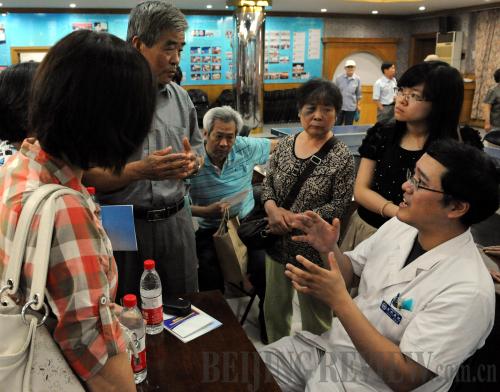|
 |
|
REASSURANCE: A doctor at Beijing Xuanwu Hospital answers questions about bladder cancer during an activity to promote public awareness on June 15 (TANG ZHAOMING) |
Kaifu Lee, the former head of Google China, said that he was diagnosed with lymphoma on his micro-blog on September 5.
"Life is limited. Everyone is equal in the face of cancer," said Lee, 51, who currently runs venture capital fund Innovation Works, in a post on Sina Weibo, China's twitter-like micro-blogging service. His statement was forwarded nearly 7,000 times within half an hour. Lee's high-profile announcement drew increased public attention to cancer, which is a leading cause of death in China.
A report released by China's National Central Cancer Registry in January showed that an average of six people are diagnosed with cancer every minute in the country. Every day, 8,550 patients begin treatment for the disease, which claims 2.5 million lives every year in China.
The report also revealed that lung, stomach, colorectal, liver and esophageal cancers are the most prevalent, with lung cancer having the highest mortality rate. "Deaths from lung cancer have risen by 465 percent in the past 30 years," it said.
The Beijing Residential Health Report, released at the start of the year by the Beijing Municipal Health Bureau, said that in 2001-11, the city's cancer morbidity rates grew by 48 percent.
Bad habits
"With an aging society, China has more and more elderly cancer patients," said Chen Wanqing, Deputy Director of China's National Cancer Prevention and Control Research Office.
According to China's sixth national population census, the results of which were released in April, China has 145 million people over 60, accounting for 11 percent of the country's population. This group is growing at a rate of more than 3 percent per year. Experts predict that in the next 30 years, China will see its elderly population exceeding 400 million.
"It is a big challenge since older people are at a higher risk of cancer," Chen said.
Worse still, medical experts warn that young people are also at risk.
Xu Congjian, President of the Obstetrics and Gynecology Hospital of Fudan University in Shanghai, said that women suffering from cancer are younger than before. His statistics showed that among all gynecological cancer patients, 21 percent are young women without children.
Lee said that the cancer had made him second-guess the physical sacrifices he had made during his career. "I naively used to compete with others to see who could sleep less," he wrote on Sina Weibo. "It's only now, when I'm suddenly faced with possibly losing 30 years of life, that I've been able to calm down and reconsider. That sort of persistence may have been a mistake."
"The high rates of cancer come from a change in lifestyles," said Wang Ning, Deputy Director of the Beijing Institute for Cancer Research under the Beijing Cancer Hospital. "For example, colorectal cancer was not in the top five a decade ago, but now it has become the second most common after lung cancer."
"Twenty percent of deaths due to cancer in China are related to diet, nutrition and a lack of exercise," said Lei Haichao, Deputy Director of the Beijing Municipal Health Bureau. He added that obesity and alcohol abuse have also increased the number of deaths from cancer.
Wang said that more than 20 percent of cancer cases she dealt with could have been treated successfully if people had paid more attention to their health and had it diagnosed earlier.
"Public notions of keeping yourself in good health need adjustment, and they are contributing to deaths from cancer," Wang said. "Unwillingness to take medical tests as well as ignorance about health issues are still common."
Environmental factors
Environmental pollution has also been blamed for increasing cancer rates.
"There is a misguided concept that lung cancer is only caused by smoking," said Zhang Zhiyong, a doctor with the Department of Cerebral Surgery at Peking Union Medical College Hospital. "Recent clinical findings show that non-smokers outnumber smokers amongst all lung cancer patients."
"Focusing on reducing air pollutant emissions should be prioritized rather than urging people to adopt a healthy lifestyle," said Ma Jun, Director of the Institute of Public and Environmental Affairs, a non-governmental organization in Beijing. "Although not doing physical exercise weakens the immune system, exercise can harm the body when the air is full of smog," he said.
The Beijing Residential Health Report also showed much lower cancer rates in the suburbs, where pollution is less than in built-up areas of the city.
| 